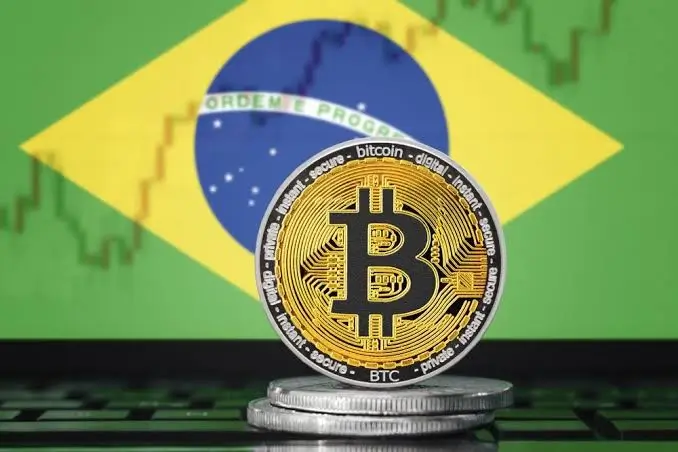Brazil is exploring a new tax initiative that places digital assets at the centre of its economic reform strategy. The government is proposing a tax on cryptocurrency transactions as a way to offset a planned increase in the IOF (Tax on Financial Operations), sparking mixed reactions across the investment community.
As part of broader fiscal restructuring, this proposal aims to channel untapped revenue streams without directly impacting the general population—many of whom are already burdened by inflation and rising living costs. The potential move highlights how cryptocurrency, long considered outside traditional tax systems, is now squarely within Brazil’s financial policy focus.

Brazil Plans Crypto Tax to Boost Revenue ( Image Source: PYMNTS.com )
Crypto Transactions Face New Tax Reality
Millions of Brazilian crypto users—ranging from casual holders to seasoned traders—are now facing the prospect of tighter tax regulations. Previously, digital assets enjoyed more lenient treatment under the tax code, especially those held or traded via foreign platforms. The new plan intends to change that.
Under the proposal, profits from crypto trades conducted through international exchanges would be taxed similarly to gains from domestic financial investments. This shift not only aligns crypto earnings with traditional financial instruments but also extends the government’s regulatory reach beyond national borders.
Driving Forces Behind the Policy
The Brazilian government’s motivation is clear: boost public revenue without fuelling inflation or inviting widespread backlash. Finance Minister Fernando Haddad is reportedly leading the effort, eyeing crypto profits—especially those earned overseas—as a viable and underutilised source of income.
Given the billions of dollars in digital assets traded by Brazilians annually, the government sees a substantial opportunity to bolster the public purse without imposing direct tax hikes on everyday necessities or wages.
Why Crypto Is in the Crosshairs
Compared to traditional financial systems, crypto has remained largely under-regulated and opaque. While banks and domestic transactions are subject to close scrutiny, decentralised assets have often operated outside strict oversight.
Now, with DeFi (decentralised finance) platforms gaining popularity and foreign crypto exchanges capturing large market shares, Brazilian authorities are moving to bridge the regulatory gap. Experts note that Brazil’s approach mirrors a regional trend, as several Latin American countries seek to define crypto’s role in their fiscal frameworks.
As Latin America’s largest economy, Brazil’s actions will likely influence the region’s approach to crypto taxation.
Also Read: Bitcoin Slips Below $100K Amid Profit-Taking and Trump-Musk Political Tensions
Balancing Act: Economic Strategy and Public Sentiment
This proposal forms part of Brazil’s larger economic balancing act. While increasing the IOF is one avenue to generate funds, it carries significant political risk. The IOF is already seen as an unpopular levy, and further hikes could fuel public dissent.
By targeting foreign crypto transactions instead, lawmakers aim to generate new revenue with minimal immediate political cost. Fewer people are directly affected, and the tax burden shifts toward higher-income investors and offshore activities, rather than domestic spending or consumption.
Implications for Crypto Users
If approved, the measure would have significant implications for Brazil’s crypto community. Investors may need to reconsider their platforms, strategies, and recordkeeping. International crypto exchanges could become less attractive due to the new tax obligations and reporting requirements.
In turn, this could strengthen the position of local exchanges, as users look to avoid regulatory complications. However, privacy-focused traders and decentralised exchange users might migrate further into unregulated corners of the crypto ecosystem—creating new challenges for enforcement.
Moreover, the law would formalise Brazil’s stance on crypto as a taxable asset class, potentially boosting legitimacy while also raising barriers for newcomers.
Industry Reactions: Mixed but Watchful
Reactions within Brazil’s crypto industry have been mixed. Some players see the move as a step toward mainstream adoption and recognition of digital assets. Others worry about increased bureaucracy, compliance burdens, and the potential stifling of innovation.
A prominent investor commented, “Taxation could stabilise the crypto space, but it must be executed with clarity. If it’s poorly implemented, users will lose trust and shift to less transparent systems.”
Industry groups are urging the government to engage in open consultations and provide robust educational resources. Clear guidance and digital tax literacy will be essential to helping the public understand and adapt to the changes.
Could Brazil Lead a Regional Shift?
Brazil’s proposal could serve as a model for neighbouring countries. Argentina, Colombia, and Chile are all watching closely as they explore their own crypto tax frameworks. If Brazil succeeds in integrating digital assets into its revenue strategy, it may set a precedent for other Latin American economies.
As the region continues its digital transformation, the regulation of decentralised assets is becoming a shared priority.
Final Take: A Tipping Point for Crypto in Brazil
Brazil’s crypto tax initiative represents more than just a financial adjustment—it’s a turning point in how governments approach decentralised finance. Whether it becomes an obstacle or an opportunity depends on implementation, transparency, and public trust.
One thing is certain: the line between digital assets and traditional finance is rapidly blurring in Brazil. With the government’s eyes now firmly on crypto, the country’s digital finance landscape may never be the same.

